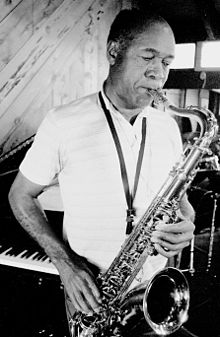Buddy Collette
Buddy Collette (born William Marcel Collette ; born August 6, 1921 in Los Angeles , California ; † September 19, 2010 ibid) was an American jazz musician ( tenor saxophone , flute and clarinet ) who had a great influence on the West Coast Had jazz and was a teacher of important musicians .
life and career
At the age of 12, Collette began playing the alto saxophone and led his first jazz band , which included Britt Woodman on trombone and Charles Mingus on bass. At the age of 17 he became a professional musician. After serving as a band leader in the U.S. Navy, he worked with the Stars of Swing (which included Woodman, Mingus, and Lucky Thompson ). He then played bebop in Los Angeles with saxophonist Dexter Gordon , Charles Mingus and Chico Hamilton . He was one of the first modern jazz flutists . He was a studio musician in the early 1950s and was the first African American musician to appear on television (on Groucho Marx's You Bet Your Life program ).
In 1955 he was a founding member of the legendary Chico Hamilton quintet with guitarist Jim Hall and cellist Fred Katz . In 1956 he recorded his first album as a band leader (Man of Many Parts) . His collaboration with saxophonist Dexter Gordon, drummer Chico Hamilton and his long-time friend Charles Mingus ( Mingus at Monterey , 1964) established his position on the Los Angeles jazz scene, as did his early advocacy of the unification of the local musicians' union, which was initially separated by skin color.
In contrast to other influential musicians of West Coast jazz , Collette stayed in California, where he worked in the studios and also played and recorded with his quintet every weekend, but also trained other woodwind players. His students include Eric Dolphy , Charles Lloyd , Frank Morgan , Sonny Criss, and James Newton . Only occasionally did he tour Europe.
In 1996 the Library of Congress commissioned him to compose and perform a big band concert. Since a stroke in 1998 he was no longer able to perform as a musician, but remained active as a jazz teacher in Los Angeles (including with children's programs). Collette was also very active in the civil rights movement.
Autobiographical book publication
- Buddy Collette, Steven Louis Isoardi: Jazz Generations: A Life in American Music and Society . New York, London: Continuum 2000; ISBN 978-0826447210
Web links
- Web presence with discography
- Buddy Collette in the Internet Movie Database (English)
- Detailed interview with Buddy Collette from May 2010 (5 parts, English) (accessed on February 28, 2011)
- Obituary in The New York Times
- Buddy Collette at Discogs (English)
Individual evidence
- ↑ Don Heckman: Buddy Collette dies at 89; LA jazz saxophone player, band leader. In: Los Angeles Times . September 21, 2010, accessed April 10, 2011 .
| personal data | |
|---|---|
| SURNAME | Collette, buddy |
| ALTERNATIVE NAMES | Collette, William Marcel |
| BRIEF DESCRIPTION | American jazz musician (tenor saxophone, flute and clarinet) |
| DATE OF BIRTH | August 6, 1921 |
| PLACE OF BIRTH | los Angeles |
| DATE OF DEATH | September 19, 2010 |
| Place of death | los Angeles |
